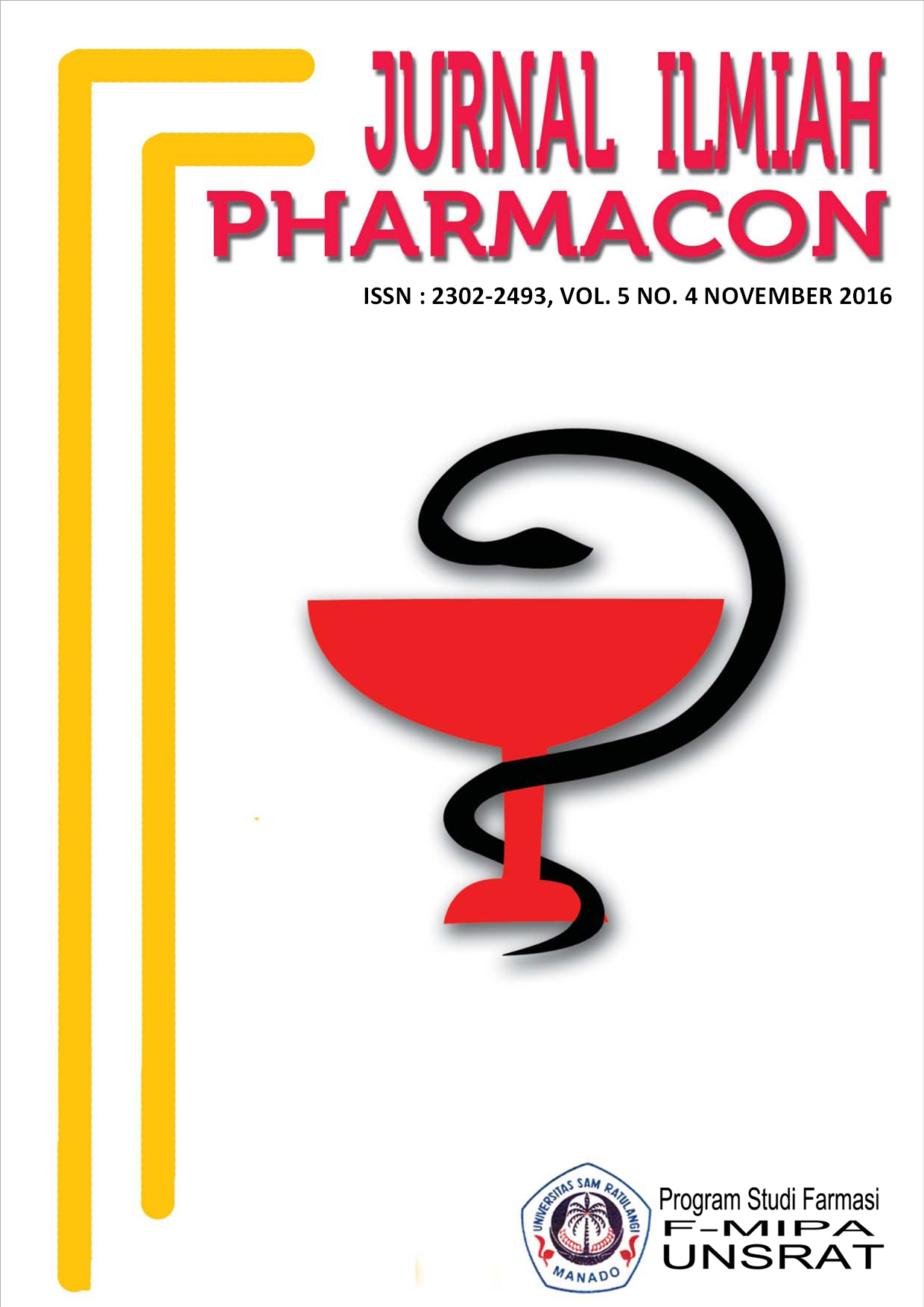UJI DAYA ANTIBAKTERI EKSTRAK ETANOL UMBI WORTEL (Daucus carota L.) TERHADAP Staphylococcus aureus DAN Escherichia coli SECARA IN VITRO
DOI:
https://doi.org/10.35799/pha.5.2016.13985Abstract
UJI DAYA ANTIBAKTERI EKSTRAK ETANOL UMBI WORTEL
(Daucus carota L.) TERHADAP Staphylococcus aureus DAN Escherichia coli
SECARA IN VITRO
Arsenius Y. Sirait1), Nancy C. Pelealu1), Paulina V.Y. YamLean 1)
1)Program Studi Farmasi FMIPA UNSRAT Manado, 95115
ABSTRACT
              Infectious diseases is one of the problems in the field of health from time to time continue to grow. Staphylococcus aureus (S. aureus) and Escherichia coli (E. coli) is a bacterium that causes most infections in the community and nosocomial infections. This study aims to provide information about the antibacterial activity of ethanol extract of carrot root of carrot (Daucus carota L.) on Staphylococcus aureus and Escherichia coli in vitro. Extraction was done by maceration method using ethanol 96%. Testing for antibacterial activity using agar diffusion method (Kirby and Bauer diffusion modified) by way of pitting. Antibacterial activity test results analyzed by One Way Anova (analysis of variance one way) followed by Duncan test. The result showedvthat extract concentrations of 5%, 10%, 20%, 40%, and 80% have to provide activities that inhibits the growth of test bacteria. Any increase in concentrations of 5% (3,50 mm), 10% (3,67 mm), 20% (4,83 mm), 40% (5.16 mm) and 80% (6, 67 mm) for a review of Escherichia coli and a concentration of 5% (3,17 mm), 10% (3.83 mm), 20% (4,00 mm), 40% (4,17 mm) and 80% (4,33 mm) to review the bacterium Staphylococcus aureus. But not effective hearts activities inhibit bacteria due to inhibition zone from the second test bacteria each singer were moderate. As for inhibiting have to use a strong inhibition zone (5-10 mm) or the most powerful (> 20 mm). Â
Keywords: Antibacterial activity, Daucus Carota L, pathogen bacterial, the agar diffusion method
ABSTRAK
Penyakit infeksi merupakan salah satu masalah dalam bidang kesehatan yang dari waktu ke waktu terus berkembang. Staphylococcus aureus (S. aureus) dan Escherichia coli (E. coli) merupakan bakteri penyebab terbanyak infeksi di komunitas dan infeksi nosokomial. Penelitian ini bertujuan untuk dapat memberikan informasi tentang aktivitas antibakteri dari ekstrak etanol umbi wortel (Daucus carota L.) terhadap bakteri Staphylococcus aureus dan Escherichia coli secara in vitro. Ekstraksi dilakukan dengan cara maserasi menggunakan pelarut etanol 96%. Pengujian aktivitas antibakteri menggunakan metode difusi agar (difusi Kirby dan Bauer yang dimodifikasi) dengan cara sumuran. Hasil uji aktivitas antibakteri dianalisa dengan metode One Way Anova (Analisa varians satu arah) dilanjutan dengan uji Duncan. Hasil data menunjukkan bahwa konsentrasi ekstrak 5%, 10%, 20%, 40%, dan 80% telah memberikan aktivitas yang menghambat pertumbuhan bakteri uji. Ekstrak etanol umbi wortel (Daucus carota L.) memiliki efek antibakteri..Terdapat penambahan diameter zona hambat pada setiap kenaikan konsentrasi 5% (3,50 mm) , 10% (3,67 mm), 20% (4.83 mm), 40% (5,16 mm) dan 80% (6,67 mm) untuk bakteri Escherichia coli dan konsentrasi 5% (3,17 mm) , 10% (3,83 mm), 20% (4,00 mm), 40% (4,17 mm) dan 80% (4,33 mm) untuk bakteri Staphylococcus aureus. Namun tidak efektif dalam menghambat aktivitas bakteri dikarenakan zona hambat dari kedua masing-masing bakteri uji ini termasuk sedang. Sedangkan untuk menghambat harus menggunakan zona hambat yang kuat (5-10 mm) atau paling kuat ( > 20 mm).
Kata Kunci: Aktivitas antibakteri, Daucus Carota [L], bakteri patogen, metode difusi agar
Downloads
Published
How to Cite
Issue
Section
License
Authors who publish with this journal agree to the following terms:
- Authors retain copyright and grant the journal right of first publication with the work simultaneously licensed under a Creative Commons Attribution-NonCommercial 4.0 International License that allows others to share the work with an acknowledgement of the work's authorship and initial publication in this journal.
- Authors are permitted and encouraged to post their work online (e.g., in institutional repositories or on their website) prior to and during the submission process, as it can lead to productive exchanges, as well as earlier and greater citation of published work (See The Effect of Open Access)










